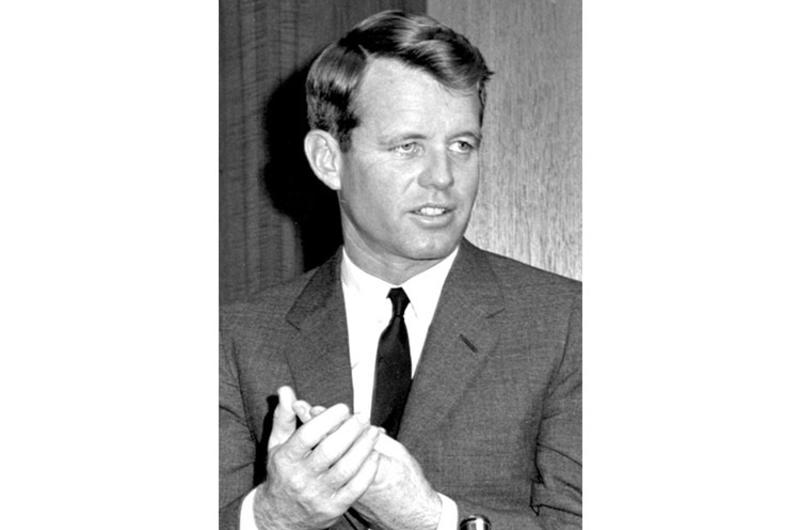

This website was created and maintained from May 2020 to May 2021 to commemorate the 75th anniversary of Stars and Stripes operations in the Pacific.
It will no longer be updated, but we encourage you to explore the site and view content we felt best illustrated Stars and Stripes' continued support of the Pacific theater since 1945.
Peace comes first, RFK and Sukarno agree

Tokyo, January 1964: Attorney General Robert Kennedy leaves the Imperial Hotel with Indonesian Foreign Minister Subandrio after his meeting with President Sukarno, then talks to the press at the Nissei Theater.
By Steve Stibbens | Stars and Stripes January 19, 1964
TOKYO — Atty. Gen. Robert F. Kennedy Saturday resumed talks with Indonesian President Sukarno over the Malaysia crisis after a 90-minute meeting Friday gained somewhat of a cease-fire agreement from the Indonesian president.
Spokesmen for both Kennedy and Sukarno said Friday's talks produced an agreement that "the problem should be solved by consultation between parties concerned" and that a "favorable climate must created for the consultations."
Saturday morning however, an Indonesian spokesman said Sukarno would not join in talks with Malaysia and the Philippines until the 10 British battalions are withdrawn from the Borneo border.
Kennedy, in a last-minute change of plans, was to leave Japan Saturday for an overnight trip to Korea to visit with some of the 50,000 U.S. soldiers there.
A source said the attorney general may make a social call on Korean President Chung Hee Park, but the trip has no political significance.
A source said the meeting at Sukarno's Imperial Hotel suite was "very cordial," "went very well indeed,'' and that progress was made.
He said Kennedy is not attempting to offer solutions to settling the Malaysia-Indonesia dispute but just wants to "see that the countries involved sit down and talk and not shoot at each other."
The crisis grew out of Sukarno's opposition to the formation of the Malaysian Federation last September. The Indonesian President calls the British-sponsored federation "colonialism and imperialism in disguise" and has openly vowed to "crush" Malaysia.
Bloody skirmishes between Sukarno-backed guerrillas and British-backed Malaysian soldiers have occurred in recent weeks along the Borneo-Malaysia border. Britain has some 7,000 troops deployed to North Borneo.
The source said the "escalating situation" there has caused considerable concern in the National Security Council, of which Kennedy is a member. He said Sukarno's "confrontation" of Malaysia "could escalate into a major conflict within the next two months if steps were not taken immediately."
The source said that U.S. involvement is only that "we have an interest in peace and have a friendship bond with each of the countries concerned. This automatically involves us."
He said if the situation developed into a major conflict, U.S. involvement would hinge on interpretation of the Anzus Treaty signed in 1951. The treaty, between Australia, New Zealand and the U.S., allows any member to call on others to bolster their defense.
Also, the source said, Congress has been concerned about foreign aid. Congressmen want the President to decide right now whether to continue aid to Indonesia.
He pointed out that the rules of U.S. foreign aid provide that no aid should be given to any country that is preparing for or involved in hostilities against any country.
"However," the source said, "the present amount of aid to Indonesia (which amounts to some $12 million, exclusive of surplus commodity assistance) would not be an overwhelming factor. Its withdrawal certainly wouldn't topple Indonesia."
The source said the subject of foreign aid was not discussed at Friday's talk. He said Kennedy did not spell out what the U.S. would do under any given set of circumstances if the crisis was not settled peacefully.
He said Sukarno told Kennedy what his objections were toward Malaysia. The objections were the same as made in public and event beyond, he said.
Before seeing Sukarno Friday, Kennedy conferred briefly with Japanese Foreign Minister Masayoshi Ohira. During the talk, Ohira became ill and was forced to conclude the meeting.
He is to meet in Manila Sunday with Philippines president Diosdado Macapagal to continue talks on Malaysia.


